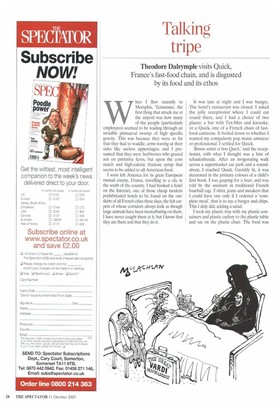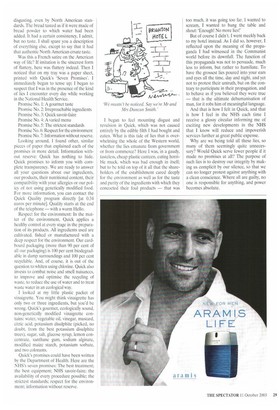Talking tripe
Theodore Dalrymple visits Quick, France's fast-food chain, and is disgusted by its food and its ethos Nvhen I flew recently to Memphis, Tennessee, the first thing that struck me at the airport was how many of the people (particularly employees) seemed to be wading through an invisible primaeval swamp of high specific gravity. This was because they were so fat that they had to waddle, arms waving at their sides like useless appendages; and I presumed that they were herbivores who grazed not on primitive ferns, but upon the corn starch and high-calorie fructose syrup that seems to be added to all American food.
I soon left America for its great European mutual enemy, France, travelling to a city in the south of the country. I had booked a hotel on the Internet, one of those cheap modem prefabricated hotels to be found on the outskirts of all French cities these days, the felt carpets of whose corridors always look as though large animals have been masturbating on them. I have never caught them at it, but I know that they are there and that they do it. It was late at night and I was hungry. The hotel's restaurant was closed. I asked the jolly receptionist where I could eat round there, and I had a choice of two places: a bar with Tex-Mex and karaoke, or a Quick, one of a French chain of fastfood canteens. It boiled down to whether I wanted my compulsory pop music amateur or professional. I settled for Quick.
'Bonne soirée et bon Quick,' said the receptionist, with what I thought was a hint of schadenfreude. After an invigorating walk across a supermarket car park and a roundabout, I reached Quick. Garishly lit, it was decorated in the primary colours of a child's first book. I was gasping for a beer, and was told by the assistant in traditional French baseball cap, T-shirt, jeans and sneakers that I could have one only if I ordered a 'complete meal', that is to say a burger and chips. This I duly did, adding a salad.
I took my plastic tray with my plastic containers and plastic cutlery to the plastic table and sat on the plastic chair. The food was disgusting, even by North American standards. The bread tasted as if it were made of bread powder to which water had been added. It had a certain consistency, I admit, but no taste. I shall spare you a description of everything else, except to say that it had that authentic North American ersatz taste.
Was this a French satire on the American way of life? If imitation is the sincerest form of flattery, here was flattery indeed. Then I noticed that on my tray was a paper sheet, printed with Quick's 'Seven Promises'. I immediately began to tense up; I began to suspect that I was in the presence of the kind of lies I encounter every day while working in the National Health Service.
Promise No. 1: A gourmet taste Promise No. 2: Irreproachable ingredients Promise No. 3: Quick savoir-faire Promise No. 4: A varied menu Promise No. 5: The strictest standards Promise No. 6: Respect for the environment Promise No. 7: Information without reserve.
Looking around, I found other, similar pieces of paper that explained each of the promises in more detail. Information without reserve: Quick has nothing to hide. Quick promises to inform you with complete transparency. We are ready to answer all your questions about our ingredients, our products, their nutritional content, their compatibility with your allergies or our policy of not using genetically modified food. For more information, you can contact the Quick Quality program directly [at 0.34 euros per minute]. Quality starts at the end of the telephone — with a warm Hello.
Respect for the environment: In the matter of the environment, Quick applies a healthy control at every stage in the preparation of its products. All ingredients used are cultivated, fished or manufactured with a deep respect for the environment. Our cardboard packaging (more than 90 per cent of all our packaging) is 100 per cent biodegradable in damp surroundings and 100 per cent recyclable. And, of course, it is out of the question to whiten using chlorine. Quick also invests to combat noise and smell nuisances, to improve and optimise the recycling of waste, to reduce the use of water and to treat waste water in an ecological way.
I looked at my little plastic packet of vinaigrette. You might think vinaigrette has only two or three ingredients, but you'd be wrong. Quick's gourmet, ecologically sound, non-genetically modified vinaigrette contains: water, vegetable oil, vinegar, mustard, citric acid, potassium disulphite (picked, no doubt, from the best potassium disulphite trees), sugar, salt, glucose syrup, lemon concentrate, xanthane gum, sodium alginate, modified maize starch, potassium sorbate, and two colorants.
Quick's promises could have been written by the Department of Health. Here are the NHS's seven promises: The best treatment; the best equipment; NHS savoir-faire; the availability of every procedure possible; the strictest standards; respect for the environment; information without reserve. I began to feel mounting disgust and revulsion in Quick, which was not caused entirely by the edible filth I had bought and eaten. What is this tide of lies that is overwhelming the whole of the Western world, whether the lies emanate from government or from commerce? Here I was, in a gaudy, tasteless, cheap plastic canteen, eating horrible muck, which was bad enough in itself; but to be told on top of it all that the shareholders of the establishment cared deeply for the environment as well as for the taste and purity of the ingredients with which they concocted their foul products — that was too much, it was going too far. I wanted to scream, I wanted to bang the table and shout: 'Enough! No more lies!'
But of course I didn't. I went meekly back to my hotel instead. As I did so, however, I reflected upon the meaning of the propaganda I had witnessed in the Communist world before its downfall. The function of this propaganda was not to persuade, much less to inform, but rather to humiliate. To have the grossest lies poured into your ears and eyes all the time, day and night, and yet not to protest their untruth, but on the contrary to participate in their propagation, and to behave as if you believed they were true — that is the ultimate dehumanisation of man, for it robs him of meaningful language.
And that is how I felt in Quick, and that is how I feel in the NHS each time I receive a glossy circular informing me of exciting new developments in the NHS that I know will reduce and impoverish services further at great public expense.
Why are we being told all these lies, so many of them seemingly quite unnecessary? Would Quick serve fewer people if it made no promises at all? The purpose of such lies is to destroy our integrity by making us complicit by our silence, so that we can no longer protest against anything with a clean conscience. Where all are guilty, no one is responsible for anything, and power becomes absolute.



















































































 Previous page
Previous page